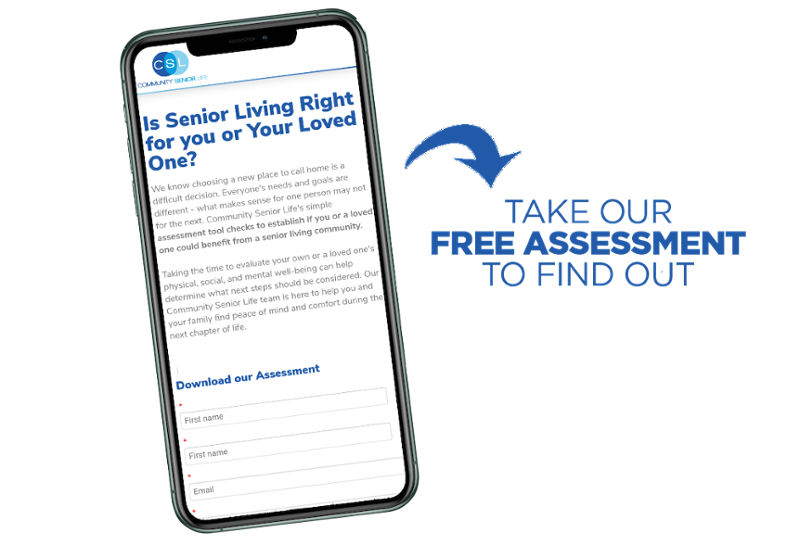Independence is something we all crave and strive to maintain, making it challenging for us to ask for or accept help from time to time. As we get older, our desire for independence can also make it difficult to know or accept when it may be time to consider additional options like an assisted senior living community.
A common misconception is that you will lose your independence by living in a senior living community, which is simply not true. These communities offer a lifestyle that can help you maintain or enhance your independence. With team members at the community taking care of the time-consuming, everyday tasks like maintenance and upkeep, you are free to live your life exactly the way you want. Leaving you more time to visit with friends and family and pursue your interests.
Throughout Alabama, Community Senior Life (CSL) communities offer senior living options ranging from independent living to Alzheimer’s and dementia care. Our goal is to promote an environment that fosters independence while providing support and assistance in the areas that each resident needs.
How do you know when it is time for assisted living? We realize this question is hard to answer, and transitioning into senior living is a significant decision. Below, we are sharing signs to help you recognize when it may be time to start the process.
1. You Have a Chronic Health Condition
According to the National Council on Aging, “approximately 80% of older adults have at least one chronic disease, and 77% have at least two.” Chronic diseases and other medical conditions can impact an individual’s ability to not only care for themselves but also maintain their home and handle other responsibilities.
If you have one or more medical conditions, such as diabetes or high blood pressure, it may be beneficial to consider an assisted senior living community. A senior living community can offer a maintenance-free lifestyle so that you have more time to focus on your health and wellness, as well as provide you with a team of caregivers who can help you manage your conditions, medications, and more.
2. Your Socialization Opportunities are Limited
We often take for granted the positive impact social interactions can have on our mental wellness. Offering benefits such as reduced stress levels, improved cognitive functioning, and boosted self-esteem, connecting with others is crucial to our well-being and can provide us with a sense of purpose.
As Joyce Carol Oates once said, “loneliness is like starvation: you don’t realize how hungry you are until you begin to eat.” Unfortunately, as we age, our socialization opportunities can become limited – we leave the workforce, children grow up and move away, etc.
Assisted senior living could be the ideal solution if you live on your own and feel yourself craving more social interaction. Our CSL communities offer activities and encourage individuals to interact with one another, forming a true sense of community. Beyond scheduled events and programs that cater to a variety of interests, residents can connect during meals, as neighbors, and more.
3. You Could Use Support with Everyday Tasks
This is a major “how do you know when it is time for assisted living” sign.
We all have days when we choose to stay in our pajamas but choosing to stay in our pajamas all day is different than not getting dressed because it is too difficult. If you find yourself needing assistance with the activities of daily living (ADLs) like personal hygiene tasks, mobility, or general home maintenance, transitioning into an assisted senior living community could be the best option to maintain your independence and improve your overall quality of life.
What Are Considered Activities of Daily Living?
According to an article published in the National Library of Medicine, “the activities of daily living (ADLs) is a term used to collectively describe fundamental skills required to independently care for oneself.”
ADLs are the physical skills we need to complete every day to lead a safe and healthy lifestyle. Broken down into five main areas, the American Council on Aging defines the basic ADLs as:
- Mobility – Also referred to as ambulating or transferring, this means being able to move around or walk both inside and outside their home.
- Dressing – Choosing and putting on appropriate clothing.
- Eating – The physical act of eating, including the proper use of utensils.
- Personal hygiene – Includes all personal grooming activities such as shaving, nail care, brushing teeth, and safely showering or bathing.
- Toileting – Sometimes called continence, this refers to having control over the bladder/bowels as well as getting on and off the toilet safely.
In addition to basic ADLs, there are also instrumental activities of daily living (IADLs). These require more complex thinking, organization, and tactical skills. However, most do not have to be performed every day. While they are not considered a part of “fundamental living,” IADLs are still necessary for a healthy and safe independent lifestyle.
The instrumental activities of daily living include:
- Transportation – Either driving, using public transportation, or arranging other means of transportation such as rides with family members.
- Meal preparation – The ability to plan and prepare meals.
- Managing finances – Paying bills, managing bank accounts, etc.
- Shopping – Buying essentials such as groceries, clothing, prescriptions, and household supplies.
- Home maintenance – Cleaning and maintaining the home, doing the laundry, etc.
- Communication – Staying in contact with friends, family, and loved ones.
- Medication management – The ability to obtain medications and take them properly.
If you find yourself taking more time to get dressed in the morning or are unable to coordinate transportation to doctor’s appointments and errands, you may benefit from transitioning into an assisted senior living community.
4. Your Eating Habits Have Changed
Healthy aging means healthy eating. If what you eat becomes more about convenience and less about nutrition, it can impact the way your body functions. Assisted senior living communities can help you maintain a balanced, nutrient-dense diet. At our CSL communities, we provide delicious meals and snacks that focus on nutrition. The best part is that you do not have to worry about preparing these meals or doing the dishes afterward!
Assisted Senior Living at Community Senior Life
Each of our assisted living communities provides an atmosphere akin to home with engaging activities and personalized services tailored to meet every resident’s unique needs. We work with individuals daily to improve or maintain their independence while always making ourselves available to provide a helping hand and assistance when needed.
We believe that healing happens when an individual feels comfortable and at home. This is why providing our residents with comfort is so important to us. Our team members strive to do everything they can to ensure residents in our assisted senior living communities receive the personalized attention and care that makes them feel welcome and part of our family.
Our assisted living features and amenities include:
- 24/7 staffing
- Personal emergency call systems
- Medication assistance
- Housekeeping
- Transportation
- Daily meals and snacks
- Dressing assistance
- Personal appearance and hygiene assistance
- Mobility assistance
Our senior living communities throughout Alabama support older adults in the areas they need while encouraging independence whenever possible. We work hard to ensure that each individual’s personal needs and preferences are met and provide opportunities for stimulation and engagement.
The decision to move into an assisted senior living community is significant, but it could improve your overall quality of life. So, how do you know when it is time for assisted living? If you are showing any of the mentioned signs, the time may be now.
To learn more about our services and discover if assisted senior living at CSL is right for you, we invite you to contact a member of our team.
Updated: August 2022

